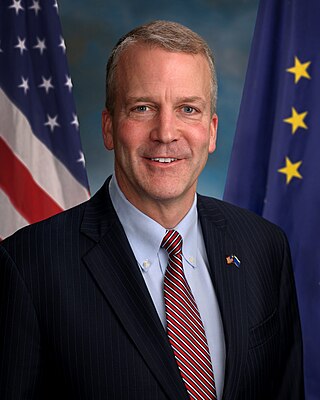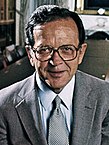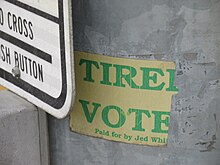
The 1996 United States Senate elections were held on November 5, with the 33 seats of Class 2 contested in regular elections. Special elections were also held to fill vacancies. They coincided with the presidential election of the same year, in which Democrat Bill Clinton was re-elected president.
Benjamin Aavan Stevens was an American politician and political advisor who served as the Chief of Staff to the Governor of Alaska, Mike Dunleavy. He previously served as the President of the Alaska State Senate as a member of the Republican Party. Stevens was the son of the late United States Senator Ted Stevens, who represented Alaska from 1968 to 2009.
The Alaska political corruption probe refers to a 2003 to 2010 widespread investigation by the Public Integrity Section of the U.S. Department of Justice, the Federal Bureau of Investigation, and the Internal Revenue Service into political corruption of nine then-current or former Alaskan state lawmakers, as well as Republican US Representative Don Young and then-US Senator, Republican Ted Stevens. Sometimes referred to as "The Corrupt Bastards Club" or the "Operation Polar Pen", the investigation focused on the oil industry, fisheries and for-profit prison industries.

The 2008 United States Senate election in Alaska was held on November 4, 2008. Incumbent Republican U.S. Senator and former President pro tempore Ted Stevens ran for re-election for an eighth term in the United States Senate. It was one of the ten Senate races that U.S. Senator John Ensign of Nevada, the chairman of the National Republican Senatorial Committee, predicted as being most competitive. The primaries were held on August 26, 2008. Stevens was challenged by Democratic candidate Mark Begich, the mayor of Anchorage and son of former U.S. Representative Nick Begich.

The 1980 United States Senate election in Alaska was held on November 4, 1980. Incumbent Democratic United States Senator Mike Gravel ran for a third term in the United States Senate, but lost in the Democratic primary to Clark Gruening, a former state representative who was the grandson of Ernest Gruening, whom Gravel had defeated twelve years prior in an election for the same seat. Gruening later went on to lose the general election to Republican nominee Frank Murkowski, a banker.

Bob Bird is an American anti-abortion activist, retired high school teacher, home-school tutor and the chairman of the Alaskan Independence Party (AIP). He was the AIP's candidate for the United States Senate seat formerly occupied by Ted Stevens in the 2008 senate election.

Electoral history of Ted Stevens, United States Senator from Alaska (1968–2009), Senate Minority Whip (1977–1981), Acting Senate Minority Leader (1979-1980), Senate Majority Whip (1981–1985), President pro tempore of the United States Senate (2003–2007) and President pro tempore emeritus (2007–2009)

The 2002 United States Senate election in Alaska was held on November 5, 2002. Incumbent Republican United States Senator Ted Stevens ran for and won a seventh term in the United States Senate. He faced perennial candidate Frank Vondersaar, the Democratic nominee, journalist Jim Sykes, the Green Party nominee, and several other independent candidates in his bid for re-election. Ultimately, Stevens crushed his opponents to win what would be his last term in the Senate, allowing him to win the highest percentage of the vote in any of his elections.

The 2004 United States Senate election in Alaska took place on November 2, 2004, alongside other elections to the United States Senate in other states as well as elections to the United States House of Representatives, various state and local elections, and the presidential election of that year. Incumbent Republican U.S. Senator Lisa Murkowski of Anchorage, sought election to her first full term after being appointed by her father Frank Murkowski to serve out the rest of the latter's unexpired term when he resigned in December 2002 to become Governor of Alaska. Her main challenger was Democratic former governor Tony Knowles, her father's predecessor as governor. Murkowski won by a slight margin.

The 2010 United States Senate election in Alaska took place on November 2, 2010, to elect a member of the United States Senate to represent the State of Alaska, alongside 33 U.S. Senate elections in other states, elections in all states for the U.S. House of Representatives, as well as various state and local elections. The general election was preceded by primary elections which were held on August 24, 2010. Scott McAdams, the Mayor of Sitka, became the Democratic nominee; Joe Miller, an attorney and former federal magistrate, became the Republican nominee after defeating incumbent U.S. Senator Lisa Murkowski. Miller was endorsed by the Tea Party movement and former Governor Sarah Palin. Murkowski announced that despite her defeat in the primary, she would run in the general election as a write-in candidate.

Daniel Scott Sullivan is an American politician and attorney serving as the junior United States senator from Alaska since 2015. A member of the Republican Party, Sullivan previously served as the commissioner of the Alaska Department of Natural Resources from 2010 to 2013, and as the Alaska Attorney General from 2009 to 2010.

The 1992 United States Senate election in Alaska was held on November 3, 1992. Incumbent Republican United States Senator Frank Murkowski sought re-election to a third term in the United States Senate. Tony Smith, the Democratic nominee and a former Commissioner of Economic Development, won his party's nomination in a crowded primary and faced off against Murkowski in the general election. Though Murkowski was held to a lower vote percentage than he received six years prior, he was ultimately re-elected.

The 2014 United States Senate election in Alaska took place on November 4, 2014, to elect a member of the United States Senate to represent the State of Alaska, concurrently with the election of the governor of Alaska, as well as other elections to the United States Senate in other states and elections to the United States House of Representatives and various state and local elections.
Theresa Nangle Obermeyer, is an American educator who is a former Anchorage, Alaska school board member, having served 2 two-year terms from 1990 to 1994. Obermeyer made an unsuccessful run against Republican Ted Stevens for the United States Senate in 1996.

The 2016 United States Senate election in Alaska was held on November 8, 2016, to elect a member of the United States Senate to represent the State of Alaska, concurrently with the 2016 U.S. presidential election, as well as other elections to the United States Senate in other states and elections to the United States House of Representatives and various state and local elections.
The Green Party of Alaska (GPAK) was a political party in the U.S. state of Alaska. It was the Alaska affiliate of the Green Party of the United States from its founding until 2021. The Green Party of Alaska was the first state to gain Green Party ballot access, in 1990, when Jim Sykes ran for governor. Sykes had previously filed a ballot access lawsuit, citing an earlier case, Vogler v. Miller.

The 2020 United States Senate election in Alaska was held on November 3, 2020, to elect a member of the United States Senate to represent the State of Alaska, concurrently with the nationwide presidential election, as well as other elections to the United States Senate, elections to the United States House of Representatives and various state and local elections. Incumbent Republican Senator Dan Sullivan won re-election to a second term in office, defeating Democratic nominee Al Gross, the son of Avrum Gross, who ran as an independent candidate. John Wayne Howe, the nominee of the Alaskan Independence Party, was also on the ballot and finished a distant third.

The 2018 United States House of Representatives election in Alaska were held on November 6, 2018, to elect the U.S. representative from Alaska's at-large congressional district, who will represent the state of Alaska in the 116th United States Congress. The election coincided with other elections to the House of Representatives, as well as elections to the United States Senate and various state and local elections.

The November 2022 United States House of Representatives election in Alaska was held on Tuesday, November 8, to elect a member of the United States House of Representatives to represent the state of Alaska. Democratic incumbent Mary Peltola won reelection to a full term in office, defeating Republicans Sarah Palin and Nick Begich III and Libertarian Chris Bye in the runoff count.

The 2021 Anchorage mayoral election was held on April 6, 2021, to elect the mayor of Anchorage, Alaska. As no candidate received at least 45% of the vote in the first round, the two candidates with the highest vote share, Forrest Dunbar and Dave Bronson, advanced to a runoff on May 11. The election was officially nonpartisan. Incumbent independent acting mayor Austin Quinn-Davidson, first appointed to the position in October 2020, was eligible to run for reelection to a full term, but did not run. The deadline to register to vote in the first round was March 7. Mail-in ballots were sent out starting on March 15. On May 21, 2021, after a narrow loss, Dunbar conceded the race to Bronson. Bronson was sworn in on July 1.


















